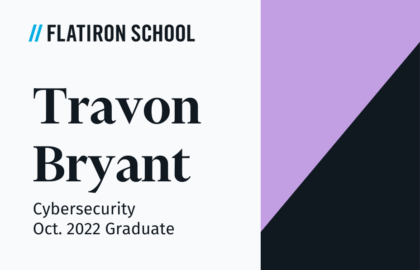People are increasingly working, studying, and networking online, and cybercriminals are taking advantage of this remote work and study model to execute malware, phishing, and other kinds of cyber attacks. We need to own our responsibility in cybersecurity and proactively work toward enhancing cybersecurity at home and in the workplace. It’s time to get cyber smart!
October is National Cybersecurity Awareness Month (NCSAM), sponsored by the National Cyber Security Alliance (NCSA) and the Cybersecurity & Infrastructure Security Agency (CISA). This year's theme is "Do Your Part. #BeCyberSmart."
To kick off the month, we’re doing our part by sharing 5 practical tips from our cybersecurity instructors on how to keep your online life safe.
5 online safety tips from cybersecurity instructors
We asked Flatiron School’s cybersecurity instructors to answer — What is one simple action people can take to keep their digital lives secure? Here’s what they said.

Tip 1: Use two-factor authentication on any applications that offer it.
— Matthew R., Cybersecurity Cohort Coach
It’s common for hackers to steal password databases or use phishing campaigns to obtain user passwords. But we can make it difficult for these cybercriminals to gain access to our devices and sensitive information by adding another layer of security.
Activate the two-factor authentication or 2FA option. 2FA will require users to confirm their identity with a one-time password or security code, in addition to their username and password. Most devices and applications offer the 2FA option under their security settings.

Tip 2: Look at every URL carefully before clicking to avoid scams or phishing.
— Aastha S., Cybersecurity Instructor
Friends and family will often share links to great deals or shocking stories. But how often do we check the authenticity of these links before clicking? Opening an unsafe link can install viruses, spyware, or ransomware on your device. Attackers could steal sensitive information from your device or even hijack it.
Most browsers have built-in tools to warn users of suspicious links or websites with an outdated security certificate. Don’t ignore the warning.
Look for https:// in webpage addresses. This means the website has a security certificate that can protect your personal information from being passed to eavesdropping criminals and man-in-the-middle attacks. In short, if you were to fill out a form on this website, you can trust it’s secure.

Tip 3: Clear your browsing history and cookies regularly.
— Ziaulhaq H., Cybersecurity Cohort Coach
In the mid-2010s, hackers managed to steal Yahoo’s code associated with its use of cookies. The result was a major breach that compromised over 32 million users’ data.
Browser history and cookies keep track of the sites we visit, the searches we make, our online shopping decisions, and every virtual activity we perform. Attackers can hijack cookies and use this information to sell your information for a profit or commit identity fraud. To avoid this scary scenario, it’s best to regularly clear your history and delete cookies.

Tip 4: Apply the latest updates and patches to your software and operating systems.
— Sayyed H., Cybersecurity Instructor
Apple’s recent emergency software update fixed a security flaw wherein hackers could access device cameras, microphones, and messages — all without a user's knowledge or a user having to click on a link.
Updates or software patches help keep hackers out by fixing security vulnerabilities in software, applications, and operating systems. Keep in mind, it's not just about you. If a virus infects your device, you could pass it on to your friends, family, and colleagues. Installing an antivirus or firewall is also not enough. Those need to be updated, too.

Tip 5: Always use common sense, online and offline.
— Hashemul K., Cybersecurity Cohort Coach
Don’t choose convenience over safety. "Password" is not a good idea for a password. Cybersecurity awareness and common sense are a must in the digital world where cybercriminals are executing increasingly sophisticated breaches, hacks, and malware installations.
This National Cybersecurity Awareness Month, let’s be cyber smart and vigilant in order to protect our data and devices and not fall prey to phishing scams.
Protect yourself (and others) with a course in cybersecurity
Following these five tips should help you stay safe online. This is the goal behind NCSAM, a joint effort between the government and the industry to make sure all Americans have the resources they need to safeguard themselves against cyberattacks.
With cybersecurity threats on the rise and individuals and enterprises looking for newer ways to protect their information and assets, the future of cybersecurity looks promising. The U.S. Bureau of Labor Statistics predicts a 33% growth in employment of information security analysts from 2020 to 2030.
If you want to make a career out of protecting devices, services, and networks from malicious digital attacks, now’s the right time. Try our free lesson — how to prevent phishing — or go all in and apply for Flatiron School’s Cybersecurity Engineering program today.




